The 2022 World Computer Chess Championships
Abstract
After two years of pandemic-related cancellations, the World Computer Chess Championship returned in July 2022. The title of World Computer Chess Champion, first contested in 1974, was successfully defended by Komodo. The World Chess Software Championship was won by Ginkgo. The World Computer Speed Chess Championship title was shared by Leela Chess Zero and Ginkgo.
1.Introduction
The World Computer Chess Championship (WCCC) is now 48 years old. The first event was held in 1974 in Stockholm as part of the annual International Federation for Information Processing (IFIP) conference. For the first 24 years, the event was held every three years, giving the programmers the time needed to make significant enhancements to their program. In 1982, Ken Thompson published a seemingly innocuous paper demonstrated the strong correlation between computing speed and chess performance (Thompson, 1982). The WCCC rules imposed no limits on the hardware that could be used by an entrant. Thus, Thompson’s paper accelerated the race for more powerful computing resources. The early years were dominated by computing speed, with the evolution of the winning programs from mainframes (e.g., Chess 4.0), to supercomputers (e.g., Cray Blitz), and then custom hardware (e.g., Belle). The hardware advances reached their culmination with Deep Blue, which used in parallel roughly 500 specially built chess chips (Hsu, 2002). This allowed for unprecedented speed, equating to deeper searches and stronger play – validation of Thompson’s work. The machine’s victory over World Chess Champion Kasparov in 1997 is a milestone in the history of artificial intelligence.
Prior to Deep Blue’s victory many of the top chess programs were the result of academic research. Post 1997, the academic component faded away and chess program development was largely led by hobbyists and commercial efforts. The humble laptop became the dominant platform for WCCC entries, with a few notable exceptions. After all, chess software for personal computers was salable; few customers had access to hardware that was more powerful. Thus, the emphasis became on developing better algorithms that integrated more knowledge with more efficient search. The days of using massive computing resources seemed over. Surprisingly, but gratifying to those who believed in performance from adding “intelligence” to a chess program as opposed to the “artificial” nature of throwing vast computing resources at the problem, the ELO ratings of the top programs quickly surpassed that of Deep Blue. The last time a strong grandmaster defeated a top chess program in a serious game appears to be 2005. Chess programs are super-human in their strength. The continuing World Computer Chess Championship helps document this rise in computer chess abilities.
With the advent of so-called “deep learning” (now a decade old) and the success of the AlphaGo Go-playing program (Silver et al., 2016), there has been a dramatic shift in the hardware being used. Parallel computing and GPUs (graphic processing units, or their AI equivalent) are now used by chess programs to accelerate machine learning algorithms, both for program development and program execution. For example, Leela Chess Zero is an open-source program that mimics the approach used in AlphaGo, relying on state-of-the-art deep-learning algorithms running on multiple GPUs.
The computer chess championships were held July 24–29, 2022, in Vienna, Austria as part of the annual International Joint Conference on Artificial Intelligence (IJCAI). The premier event was the 26th World Computer Chess Championship, the no-hardware-limit event that was first contested in 1974. Also contested were the 9th World Chess Software Championship (started in 2010, with all contestants running on identical hardware), and the World Computer Speed Chess Championship.
The Vienna results were:
World Computer Chess Champion: Komodo Dragon;
World Chess Software Champion: Ginkgo;
World Computer Speed Chess Champions: Leela Chess Zero and Ginkgo.
This article summarizes the three chess championships and reports on our experiences and observations of the events.
2.The event
IJCAI generously agreed to include the world championships as a co-located event at their annual conference. The IJCAI series began in 1969 and is regarded as the longest-running top-ranked AI conference. IJCAI also hosted the two pre-pandemic chess events in 2018 (Stockholm) and 2019 (Macau).
The three chess championships were held at the Messe Wein convention centre in Vienna. The facilities were excellent, and the IJCAI local arrangements team did a superb job of addressing all our needs.
The tournament director was Jan Krabbenbos. He has been directing ICGA chess events since 2016. Jonathan Schaeffer was head of the appeals committee.
The IJCAI organizers enforced a masking rule to reduce pandemic concerns. Until the start of the championship, there was hope that this rule would be rescinded. It was not, and one chess participant decided to withdraw. There were six programs that participated in one or more of the chess championships (see Table 1).
Table 1
Chess championship participants
| Program | Authors |
| Chiron | Ubaldo Andrea Farina |
| Ginkgo | Frank Schneider, Wolfgang Zugrav (operator) |
| Komodo Dragon | Mark Lefler, Larry Kaufman, Dietrich Kappe, Michael Whiteley, Don Dailey, Erdogan Gunes (operator) |
| Leela Chess Zero | Alexander Lyashuk et al. |
| Shredder | Stefan Meyer-Kahlen |
| The Baron | Richard Pijl |
3.World Computer Chess Championship
There were five competitors. The WCCC has no limit on the computing resources can be used. Table 2 summarizes some of the important properties of the participants. The rules are at (Rules, 2022), the results are in Table 3, and more detail on the event is available at (WCCC, 2022).
There are several things to note from the result:
Komodo Dragon won the title on tiebreak (this is discussed in more detail below). Komodo won the WCCC in 2016, 2017, 2018, and 2019. After a two-year pandemic-enforced hiatus they won again – their fifth consecutive championship! Congratulations to the Komodo team for their unprecedented success. (See Fig. 5.)
Shredder has been competing in the WCCC since 1999 – winning in 1999, 2003, and co-champion in 2009. Before that it competed in the World Microcomputer Chess Championship starting in 1995 and winning the title in 1996, 1999, and 2000.
Leela Chess Zero’s performance is impressive when one considers that the program has only one move in its opening book!
The Baron’s results disappointed its author. However, Richard Pijl was realistic given that almost no work had been done on the program in the past three years. This clearly shows that the competition is continually improving in strength.
Table 2
World Computer Chess Championship programs
| Program | Hardware | Tablebase | Opening book |
| Ginkgo | 2x AND Epyc 7763 128 cores at 3.25 GHz, water cooled. 1 Nvidia A100 512 GB RAM | 6-men | Own book created from correspondence play |
| Komodo Dragon | AMD 64 core Threadripper 3990X, 128 GB RAM (64 GB for the hash) | 6-men, some 7-men | Handmade by Erdogan Gunes |
| Leela Chess Zero | 8 Nvidia A100 GPU | 6-men | First move for White. No book for Black |
| Shredder | 64 ARM CPU | 6-men | Own book, about 1,000 positions |
| The Baron | AMD 64 core Threadripper (hyper threading off), 128 GB RAM | 6-men, some 7-men | Generated by The Baron, ∼20 GB in size |
Table 3
World Computer Chess Championship result
| Program | 1 | 2 | 3 | 4 | 5 | Total |
| Komodo Dragon | X | ½ ½ | ½ ½ | ½ 1 | 1 1 | 5 ½ |
| Leela Chess Zero | ½ ½ | X | ½ ½ | 1 ½ | 1 1 | 5 ½ |
| Ginkgo | ½ ½ | ½ ½ | X | ½ ½ | 1 1 | 5 |
| Shredder | ½ 0 | 0 ½ | ½ ½ | X | 1 1 | 4 |
| The Baron | 0 0 | 0 0 | 0 0 | 0 0 | X | 0 |
Shredder–Komodo Dragon 1.d4 Nf6 2.c4 g6 3.h4 c6 4.Nc3 d5 5.cxd5 cxd5 6.Bf4 Bg7 7.e3 Nc6 8.Be2 O-O 9.h5 Re8 10.hxg6 hxg6 11.Nf3 Bg4 12.Qb3 Na5 13.Qb4 Rc8 14.Rc1 Bxf3 15.gxf3 a6 16.Kf1 Nh5 17.Bg5 Bf6 18.Bxf6 Nxf6 19.Kg2 Kg7 20.Bd3 e6 21.Ne2 Rxc1 22.Nxc1 Nh5 23.f4 Qc7 24.Bb1 Rh8 25.Nd3 Nc4 26.Qe1 Qb6 27.b3 Nd6 28.Ne5 Qd8 29.Bd3 Nf6 30.Rxh8 Qxh8 31.Qa5 Qc8 32.Qb6 Nde4 33.a3 g5 34.f3 (Fig. 1)
Black now sacrifices a piece to force a draw by repetition. 34. .. Qc3 35.fxe4 Qd2+ 36.Kf1 Qd1+ 37.Kg2 gxf4 38.exf4 dxe4 39.Qxb7 Qd2+ 40.Kf1 Qxf4+ 41.Kg2 Qd2+ 42.Kh3 1/2-1/2
Fig. 1.
Position after 34. f3.
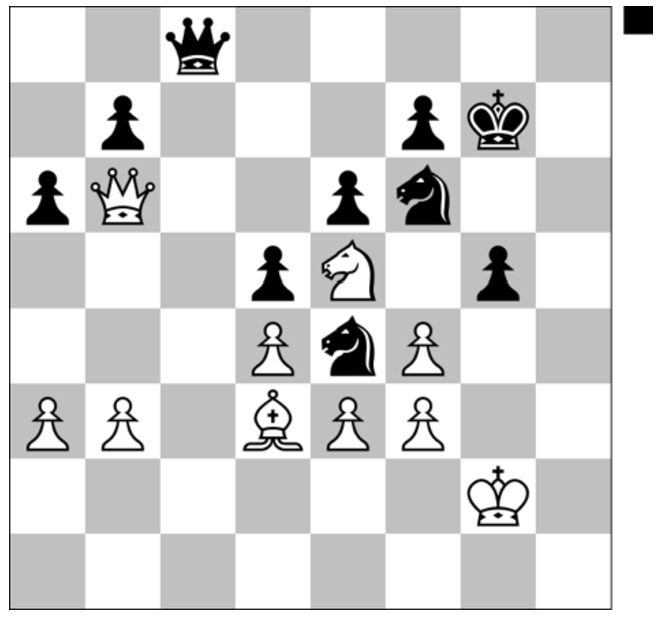
In the rematch, Komodo Dragon left its knight en prise for ten consecutive moves.
Komodo Dragon–Shredder 1.Nf3 d5 2.c4 c6 3.cxd5 cxd5 4.d4 Nf6 5.Nc3 Nc6 6.Bf4 a6 7.e3 Bg4 8.h3 Bxf3 9.Qxf3 e6 10.Bd3 Nb4 11.Bb1 Bd6 12.Bg5 h6 13.Bh4 O-O 14.a3 Nc6 15.O-O Rc8 16.Qe2 Be7 17.Na4 Na5 18.Bd3 Nb3 19.Rab1 Nd7 20.Bg3 b5 21.Nc3 Nf6 22.f3 Rc6 23.Bf2 Rc8 24.Qd1 Na5 25.a4 b4 26.Ne2 Qb6 27.e4 b3 28.e5 Nd7 29.f4 f6 30.Ng3 f5 31.Kh1 g6 32.Nh5 (Fig. 2)
The knight is fearless! 32. .. Nc6 33.a5 Qxa5 34.g4 Nb4 35.Be1 Qb6 36.Bxb4 Bxb4 37.Rg1 Kh8 38.gxf5 exf5 39.Qe2 Rc6 40.Rbd1 Qd8 41.Qg2 Qh4 (Fig. 3)
Fig. 2.
Position after 32. Nh5.
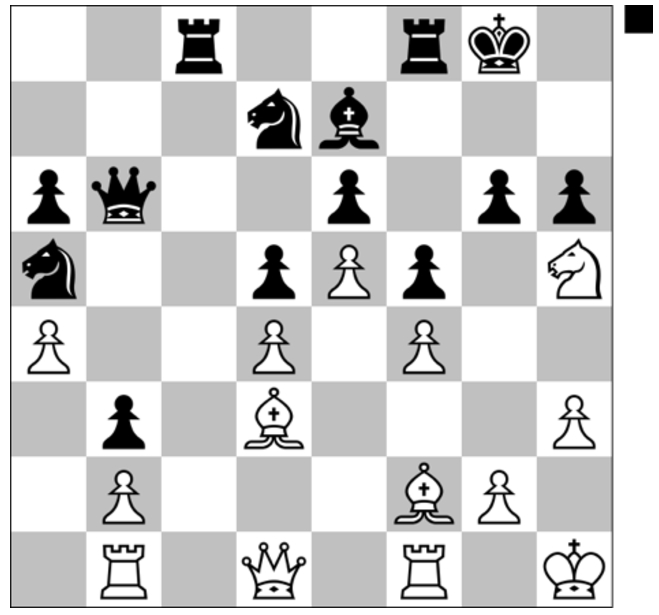
White brings the knight to safety before redeploying it with decisive effect. 42.Ng3 Qxf4 43.Ne2 Qe3 44.Rgf1 Be7 45.Nf4 Bg5 46.Nxd5 Qxd4 47.Bb5 Qh4 48.Bxc6 Nxe5 49.Bb7 a5 50.Rfe1 Nd3 1-0
Fig. 3.
Position after 41. .. Qh4.
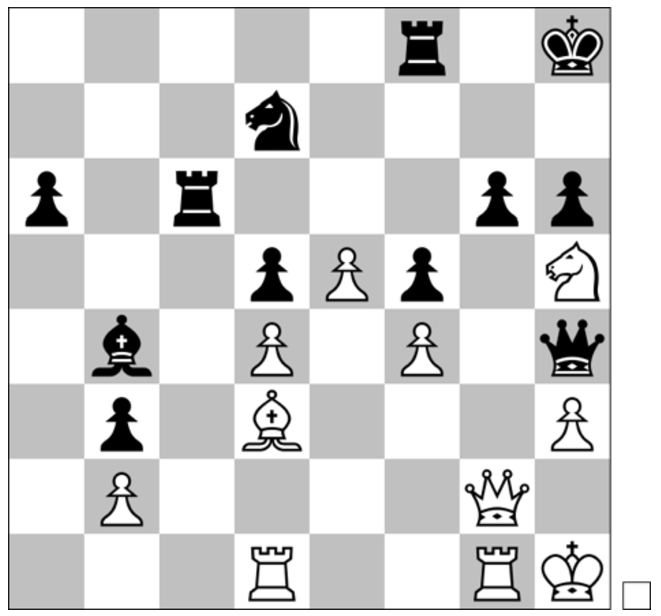
Fig. 4.
Three games underway. Photo: Jan Krabbenbos.
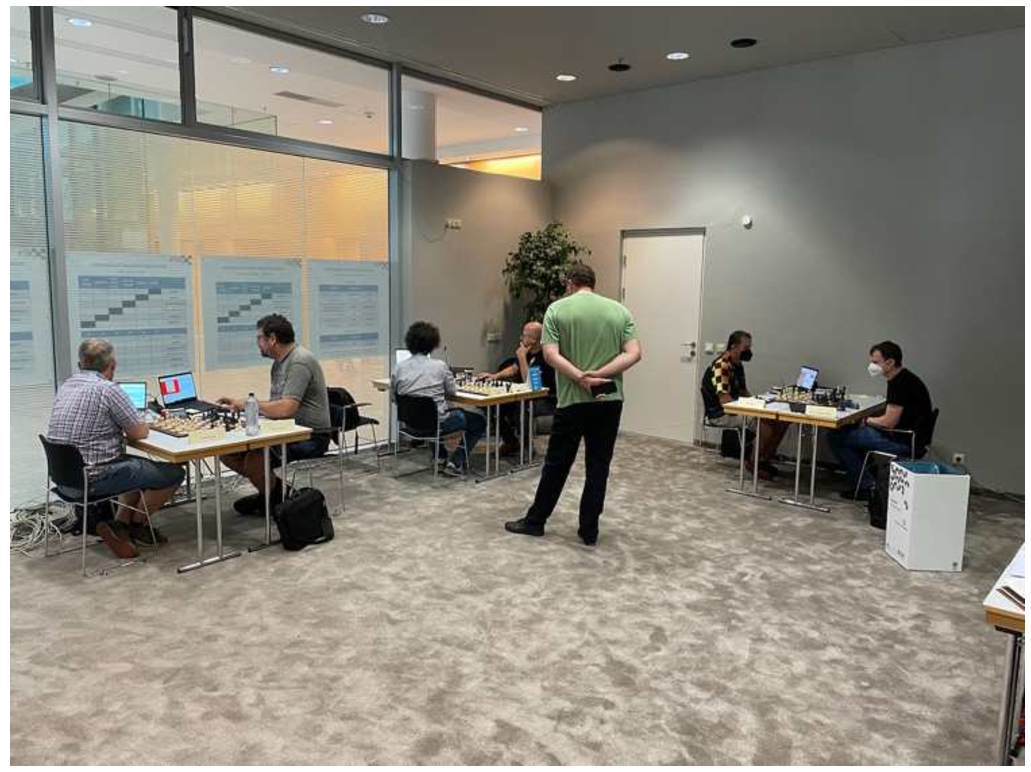
Fig. 5.
Triumphantly raising the Shannon Trophy, awarded to the winner of the World Computer Chess Championship. From left to right: Jonathan Schaeffer (ICGA President), Erdogan Gunes (Komodo operator), and Jan Krabbenbos (tournament director). Photo: Jennifer Schaeffer.
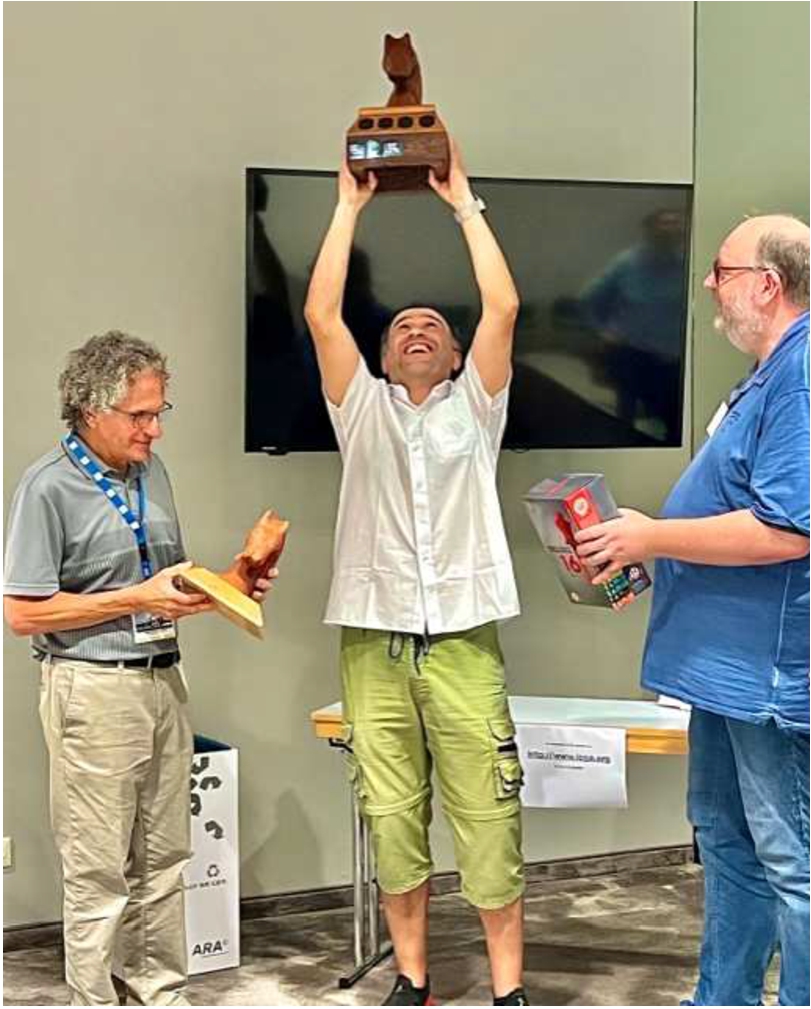
4.World Chess Software Championship
All participants used identical hardware: an AMD Ryzen 7 PRO 4750U processor with 32 GB of RAM. The rules are at (Rules, 2022), the results are in Table 4, and more detail on the event is available at (WCSC, 2022). One of the competition rounds is shown in Fig. 4.
There were six competitors, including the five WCCC participants. Chiron chose to only enter the WCSC.
Ginkgo won the championship in a playoff with Komodo Dragon (see Fig. 8). This was Ginkgo’s first championship, but it was achieved against impressive competition. Komodo had won the event in 2016, 2018, and 2019. Shredder was the winner in 2010, 2015, and 2017.
Table 4
World Chess Software Championship result
| Program | 1 | 2 | 3 | 4 | 5 | 6 | Total |
| Ginkgo | X | ½ ½ | ½ ½ | 1 ½ | ½ 1 | 1 1 | 7 |
| Komodo Dragon | ½ ½ | X | ½ ½ | ½ ½ | 1 1 | 1 1 | 7 |
| Leela Chess Zero | ½ ½ | ½ ½ | X | ½ ½ | 1 ½ | 1 1 | 6 ½ |
| Chiron | 0 ½ | ½ ½ | ½ ½ | X | ½ 0 | 1 ½ | 4 ½ |
| Shredder | ½ 0 | 0 0 | 0 ½ | ½ 1 | X | 1 ½ | 4 |
| The Baron | 0 0 | 0 0 | 0 0 | 0 ½ | 0 ½ | X | 1 |
One game stood out for a “stunning” move:
Ginkgo–Shredder 1.e4 e5 2.Nf3 Nc6 3.Bb5 Nf6 4.d3 Bc5 5.Bxc6 dxc6 6.O-O Bg4 7.h3 Bh5 8.g4 Nxg4 9.hxg4 Bxg4 10.Be3 Be7 11.Kg2 f5 12.Qe1 Qd6 13.exf5 Qd5 14.Nd2 Bxf5 15.Rg1 g5 16.Ne4 g4 17.Nfd2 h5 18.f3 Rg8 19.Kh2 O-O-O 20.Qe2 Kb8 21.Raf1 Rh8 22.Kh1 Qe6 23.Bg5 Rdg8 24.Bxe7 Qxe7 25.Rf2 b6 26.Qe3 Rg6 27.fxg4 hxg4+ 28.Rh2 Qg7 29.Rxh8+ Qxh8+ 30.Kg2 Rh6 31.Kf1 Rh3 32.Ng3 Be6 33.Nde4 Bxa2 34.Nf2 Rh2 35.Nge4 Be6 36.Ke2 Bf5 37.Kd1 Qg7 38.Kc1 Kb7 39.Kb1 Rh4 40.Qg5 Qxg5 41.Nxg5 c5 42.Nge4 Rh6 43.Nxg4 Rg6 44.Nef2 a5 45.Rg2 Be6 46.Ne3 Rxg2 47.Nxg2 c4 48.Ne3 cxd3 49.Nxd3 Kc6 50.Nxe5+ Kc5 51.c3 b5 52.Nd3+ Kb6 53.Nf4 Bf7 54.Kc2 c5 55.Nfd5+ Kc6 56.c4 bxc4 57.Nc3 Kb7 58.Kd2 Kb6 59.Ng4 (Fig. 6)
59. .. Bg8 60.Nf6 Be6 61.Ke3 Kc6 62.Kf4 Bf7 63.Kf5 Kb6 64.Nd7+ Kc7 65.Nxc5 Kc6 66.N5e4 Bh5 67.Ke5 Bf3 68.Kd4 Bh1 69.Nd2 Kb6 70.Nxc4+ Ka6 71.Kc5 Bf3 72.Kd6 Bh5 73.Kc7 Bg4 74.Nd6 Bh3 75.Na4 Ka7 76.Nb5+ Ka6 77.Nd4 Ka7 78.Nc5 Ka8 79.Nc6 a4 80.Nxa4 Be6 (Fig. 7)
Fig. 6.
Ginkgo–Shredder after 59. Ng4. Photo: Jan Krabbenbos.
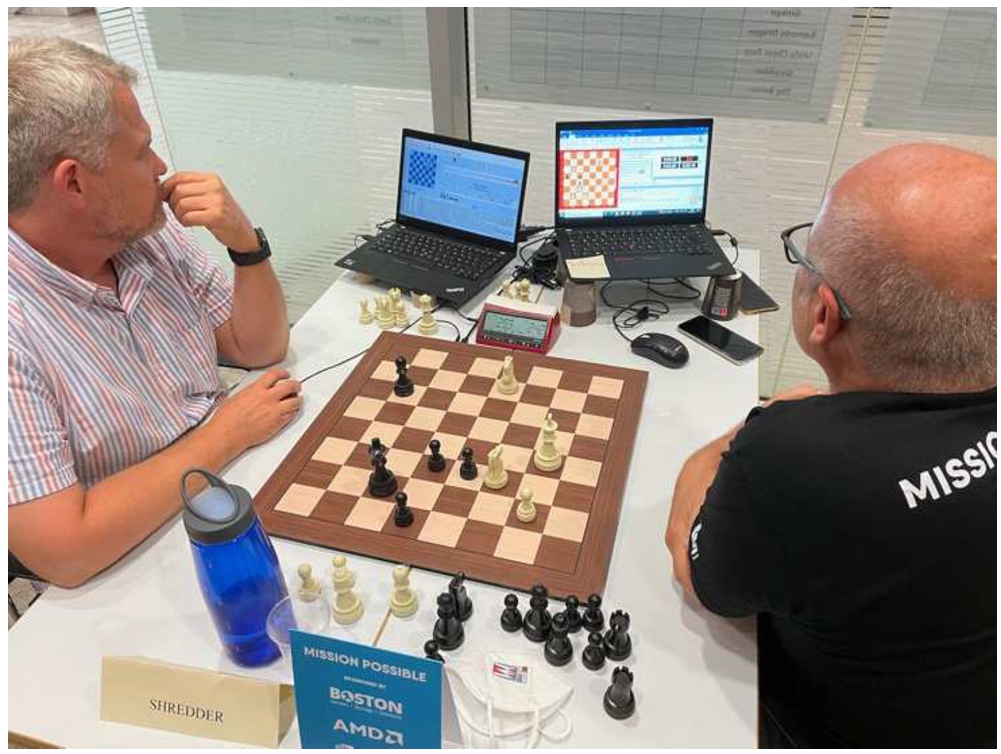
To everyone’s surprise Gingko played b4, missing mate in one (81. Nb6#). Frank Schneider, the programmer of Ginkgo, and Stefan Meyer-Kahlen, the programmer of Shredder, confirmed the stunning oversight. 81.b4 1-0
Fig. 7.
Position after 80. .. Be6.
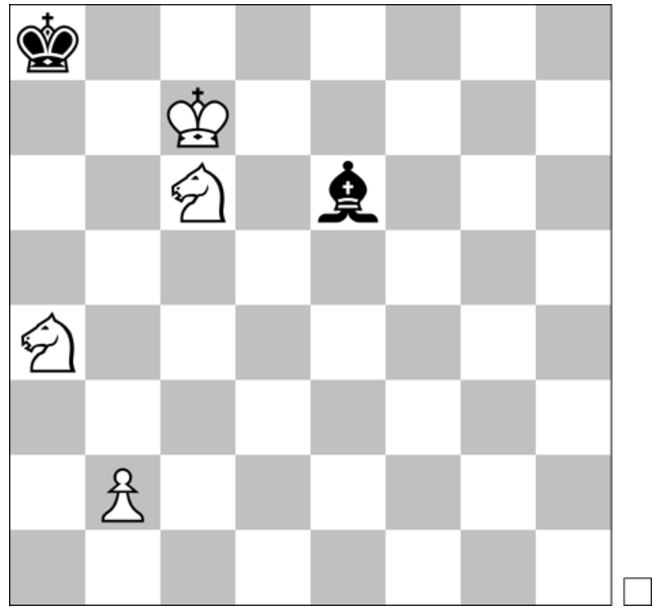
With apologies to Stefan Meyer-Kahlen, it was accidental on our part that the three games shown in this report had Shredder on the defensive/losing side. This is not a comment on the program’s strength, but rather a compliment on the program’s adventurous and entertaining play.
5.World Computer Speed Chess Championship
The speed chess championship used a time control of 5 minutes per side with 5 seconds per move. The rules are at (Rules, 2022), the results are in Table 5, and more detail on the event is available at (WCSCC, 2022).
Unfortunately, the double round robin concluded at the end of the day and the conference facility was closing. The decision was made to declare Ginkgo and Leela Chess Zero co-champions (see Fig. 8).
Table 5
World Computer Speed Chess Software Championship result
| Program | 1 | 2 | 3 | 4 | Total |
| Ginkgo | X | ½ ½ | ½ ½ | 1 1 | 4 |
| Leela Chess Zero | ½ ½ | X | ½ ½ | 1 1 | 4 |
| Komodo Dragon | ½ ½ | ½ ½ | X | 1 ½ | 3 ½ |
| Shredder | 0 0 | 0 0 | 0 ½ | X | ½ |
Fig. 8.
World Chess Software Champion Ginkgo and World Computer Speed Chess Co-Champions Ginkgo and Leela Chess Zero. Left to right: Jonathan Schaeffer, Wolfgang Zugrav (Ginkgo operator), Jan Krabbenbos, and Alexander Lyashuk (Leela operator). Photo: Jennifer Schaeffer.
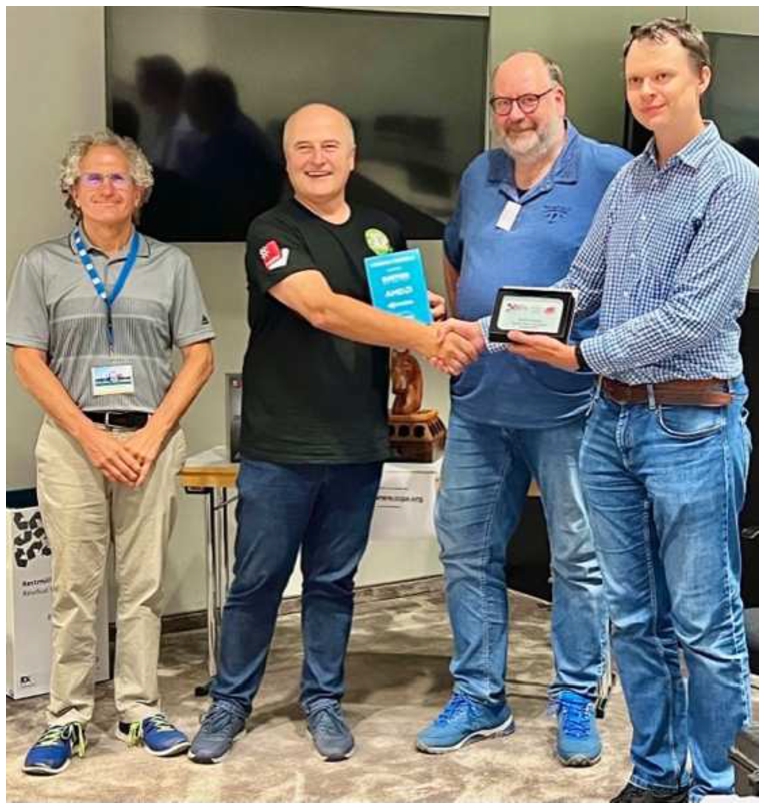
6.Discussion
The WCCC events were held with a spirit of cooperation. There were no disputes, differences were accommodated, and everything went almost seamlessly. It was a pleasure to have (from the point of view of the tournament director and organizer) a stress-free event. (See Fig. 9.)
This year all three championships resulted in a tie for first place, with two of the events being decided by a series of playoff games (there was no time for a playoff in the speed chess event). These games did not yield a decisive result. Armageddon was used to decide the titles (White gets 6 minutes, Black gets 3. Black wins a drawn game).
Armageddon is an unsatisfactory way to decide on a title as important as that of World Champion. Given the constraints of a face-to-face competition (the event must conclude on time), we need to find a better way to break a tie. Some suggestions include:
Use of Fischer random chess (randomizing the location of pieces on the back rank for each side);
Disallowing castling (an idea being popularized by former World Champion Vladimir Kramnik (Shah, 2020)); and
Disabling the opening books (which might be hard to enforce. It seems to work for Leela Chess Zero).
At the WCCC banquet, we had a discussion as to whether a 4000 ELO rating was possible. One might argue “yes” because the history of computer chess shows that the top programs continue to accumulate ELO points, albeit at a slower rate these days. The “yes” side is supported by the long-running data from the Swedish rating list of the top computer programs (Swedish Chess Program Rating List, 2022).
One can argue “no” because the top programs are so strong that there rarely is a decisive game between them. This year three programs – Ginkgo, Komodo Dragon, and Leela Chess Zero – dominated all the events. They are so strong that it’s rare that they lose a game to one another. All the games between these three programs in all events were drawn.
No conclusion was reached. It’s interesting to note that a similar discussion is happening with human players. Can the (Human) World Chess Champion reach a 2900 rating (Bendre et al., 2022)?
Fig. 9.
The Computer Chess banquet with the chess participants and organizers. Photo: Jennifer Schaeffer.
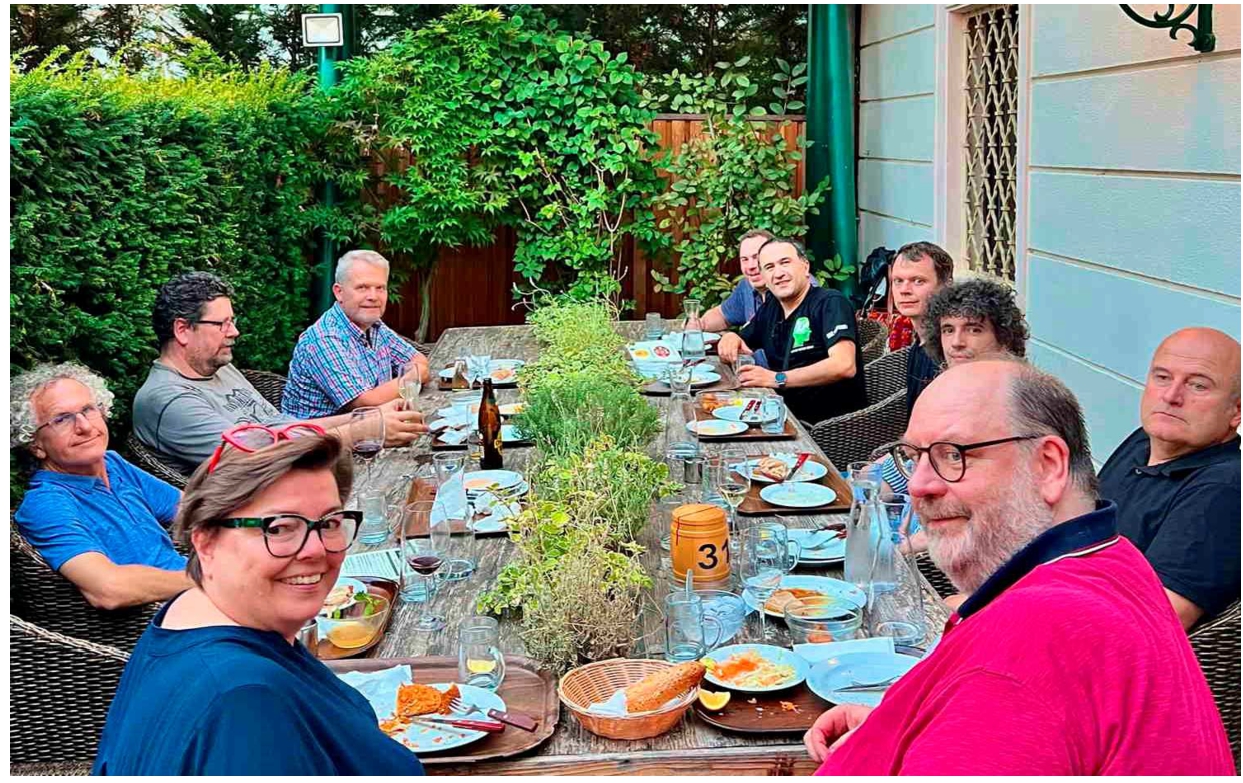
7.Conclusions
The WCCC is part of the longest running experiment in computing science history. It began with the first computer chess tournament in 1970 and continues to this day – 52 years and counting. In that time, we’ve seen the top program move from a rating of 1600 to almost 3600. It’s impressive to see that year after year the developers of the top programs find new ways to make their programs even stronger. Perhaps 4000 ELO is a possibility.
A challenge posed by having super-human chess programs is that they create an imposing barrier for anyone wanting to one day compete in the WCCC. Further, without continual improvement, a program that is competitive today is an also-ran tomorrow – as The Baron found out.
At the time of this writing, there are no concrete plans in place for chess competitions in 2023. However, we hope to do something major in 2024 – the 50th anniversary of the first World Computer Chess Championship. We welcome your ideas on how to best celebrate this important milestone.
Acknowledgements
Our deepest appreciation to the IJCAI organizers and their local arrangements team for hosting the events and efficiently addressing all our needs. We thank the Technical University of Vienna for loaning us computers for the software championship and Digital Game Technology for loaning us the electronic boards and clocks for the live broadcast.
ChessBase kindly provided prizes for the winners of each tournament.
Thank you to Grace Krabbenbos who did so many things behind the scenes to make the events a success.
References
1 | Bendre, S., Maharaj, S., Polson, N. & Sokolov, V. (2022). On the probability of Magnus Carlsen reaching 2900, arXiv:2208.09563. |
2 | Hsu, F.-h. ((2002) ). Behind Deep Blue: Building the Computer That Defeated the World Chess Champion. Princeton University Press. |
3 | Rules (2022). Rules for the 2022 World Computer Chess Championships, icga.org/wp-content/uploads/2022/05/Rules-ICGA-Chess-World-Championships.pdf. |
4 | Shah, S. (2020). First Ever ‘No-castling’ Tournament Results in 89% Decisive Games!, https://en.chessbase.com/post/the-first-ever-no-castling-chess-tournament-results-in-89-decisive-games. |
5 | Silver, D., et al. ((2016) ). Mastering the game of go with deep neural networks and tree search. Nature, 529: (7587), 484–489. doi:10.1038/nature16961. |
6 | Swedish Chess Program Rating List (2022), https://ssdf.bosjo.net/list.htm. |
7 | Thompson, K. ((1982) ). Computer chess strength. In Advances in Computer Chess 3 (pp. 55–56). Pergamon Press. doi:10.1016/B978-0-08-026898-9.50008-5. |
8 | WCCC (2022). WCCC 2022, icga.org/?page_id=3542. |
9 | WCSC (2022). WCSC 2022, icga.org/?page_id=3539. |
10 | WCSCC (2022). Speed Chess 2022, icga.org/?page_id=3544. |




